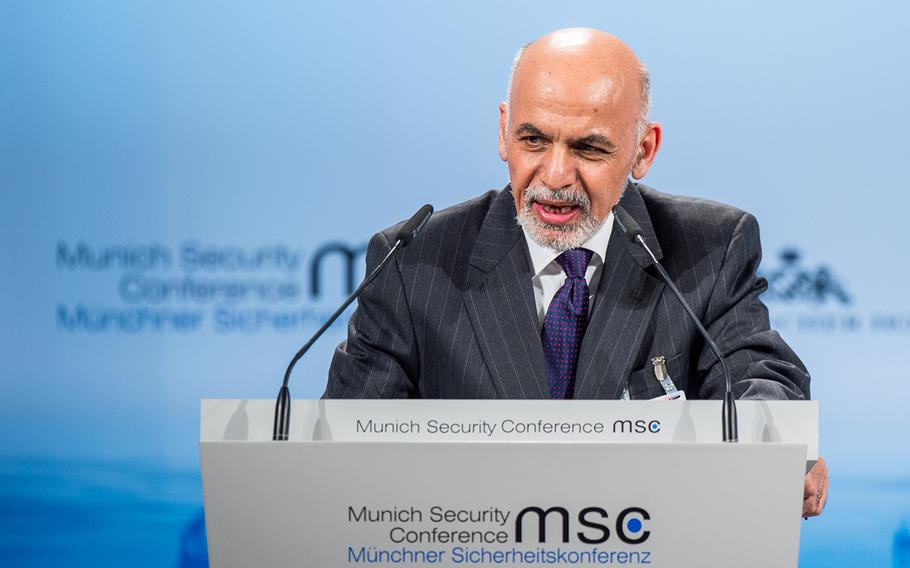Middle East
Ghani balances progress and continued need for international support at Munich conference
Stars and Stripes February 8, 2015

President Ashraf Ghani gives closing remarks at the Munich Security Conference, February 8, 2015. (Müller/MSC )
KABUL, Afghanistan — President Ashraf Ghani brought a message of hope to attendees at an international security conference in Germany on Sunday, while warning that there would be “consequences” if Afghanistan is ignored.
Ghani gave the closing speech at the Munich Security Conference, an annual gathering of world leaders, policy makers, business executives and others involved in foreign policy.
In a departure from the usual style of his predecessor, former Afghan President Hamid Karzai, Ghani began his remarks by thanking the NATO-led coalition and particularly the United States for their involvement and sacrifice in Afghanistan since the 2001 military operations that toppled the Taliban regime.
“We honor that sacrifice and that sacrifice is not going to be in vain,” Ghani said, while adding that the current training-focused, NATO-led Resolute Support mission is vital for future success. “Together, there is a substantial amount we can do.”
The coalition formally declared an end to its combat mission in Afghanistan at the end of 2014. A much smaller number of foreign troops have continued to support Afghan operations, including with air support, but the new Resolute Support mission is designed to be more focused on training and advising Afghan forces.
In a speech to the conference on Saturday, German Chancellor Angela Merkel channeled previous statements by other Western leaders in declaring that the coalition’s goals had been accomplished in Afghanistan.
“Together with the Afghans we have achieved quite a bit,” she said, before listing gains in education, health care, media, the economy, and in the number of security forces. “Above all, we have achieved our most important goal: No terrorist threat emanates any longer from Afghanistan.”
However, she acknowledged that day-to-day security in the country is “anything but satisfactory” and that corruption and the drug trade are thriving. “Therefore, we must do everything to maintain what has been achieved and to develop further,” Merkel said. “The Afghan security sector will still need substantial international support past 2016, and not just financial support.”
Ghani echoed that dual message of progress and continued need in his speech Sunday, while playing up the links between terrorism in Afghanistan and elsewhere around the world.
He sought to highlight what he sees as successes in his country, including the election that brought him peacefully to power last year, despite allegations of massive fraud that led to concerns over a possible civil war.
“Legitimacy in my country now comes from the ballot,” he told the audience, arguing that the dwindling international interest in Afghanistan is in fact evidence of progress. “Our successes have made us not be headlines, because when will the media report on a success?”
But Ghani, who still depends on billions of dollars in international aid to run his country, warned that the same threats posed by the Islamic State group and al-Qaida have roots in Afghanistan, which is still in the grip of an entrenched insurgency led by the Taliban. There will be “consequences,” he said, if the international community takes its eyes off Afghanistan.
Muslim-majority countries like Afghanistan must stand up against radicalism in the region, Ghani said.
“Daash [the Islamic State], al-Qaida and other networks are aberrations,” he said. “We must have the courage to speak for the absolute majority.”
Afghan officials tread a fine line when making the case for continued aid. Many foreign populations have come to see the long war and foreign investment in Afghanistan as a waste of time and money. Too much emphasis on gains, however, also undermines Afghan leaders’ pleas for continued support.
Afghanistan remains one of the top producers of illegal opium products, and is consistently ranked among the most corrupt countries in the word. That criminality, Ghani observed, is often overlooked in discussions about conflict in the region.
“Deep networks of criminality are drivers of conflict,” he said.
Too often observers and policy-makers focus solely on radical ideology while ignoring more basic questions, Ghani argued. “The key question is, who finances the conflict and who benefits from it?”
Still, Afghanistan’s president took care to end on a “message of hope.” Pointedly using the female personal pronoun “she” to describe a rhetorical Afghan, Ghani said his citizens have hopes rooted not in the past, but in the 21st Century.
The people of Afghanistan, he concluded, are “ready not just to open a new page but start a new book.”
smith.josh@stripes.comTwitter: @joshjonsmith